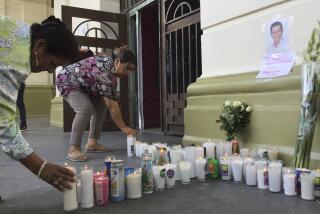Political Killings Mar Guatemala’s Struggle for Democracy
- Share via
GUATEMALA CITY — Retired Gen. Manuel Sosa Avila, his daughter and her 2-year-old son were motoring along the Avenue of the Americas here in Sosa’s black Mercedes-Benz when the killers made their move.
A pickup truck positioned itself ahead of Sosa so that he could not pass. Men on motorcycles roared up alongside and opened fire with automatic weapons, killing the general instantly. The boy died later of a head wound; his mother was wounded but has since recovered.
The assassination was carried out on Palm Sunday, a major religious holiday. But in Guatemala, there are some traditions that transcend religion, and change comes slowly.
Before the murder, many here believed that the political climate was improving and that the country was truly ready for the “democratic opening” promised by presidential elections scheduled for Oct. 27.
According to figures compiled at the U.S. Embassy, 950 civilians were killed here last year for political reasons, a significant reduction from the 500 a month or so that characterized 1981, in the darkest days of the regime of Gen. Fernando Romeo Lucas Garcia.
“In general, the greatest change in the human rights field has been the government’s clear and public recognition that pervasive and indiscriminate violence against civilians had to be stopped,” said a document prepared by the U.S. Embassy last November.
But Gen. Sosa’s assassination was a reminder of the fragile nature of Guatemela’s ostensible turn toward democracy. Along with other killings that followed, it raised fears that any hope of significant change might be canceled by the nation’s addiction to political violence.
In the 10-day period that began March 30, two human rights activists were killed--one along with her child--as well as two university professors, a labor leader and eight policemen. Six of the policemen were killed in a single incident, by assassins wielding machetes.
These killings were all here in the capital. In the countryside, the toll of violence included a woman and her three children, age 9 to 13, in a village in the Indian highlands near Santa Cruz del Quiche.
As that incident was recounted to the police by a neighbor, armed men arrived at the home of Rosario Perez on the Saturday before Easter and demanded to see a man named Cristobal. When Perez said there was no one there of that name, the men shot her entire family.
As usual, no one has identified the killers or their motive. But it is widely believed that such armed groups are searching for suspected guerrillas and could not operate without government sanction.
“Ordinary criminals would have little reason to target poor peasants, students, catechists and trade union members,” according to a report issued by Americas Watch, a human rights group based in New York. “There is often circumstantial evidence establishing the involvement of government security forces, such as weapons or vehicles unavailable to other segments of the community.”
As with other incidents, the Sosa killing raised suspicions of government involvement, despite the general’s long record of government service and the fact that he was a brother-in-law of a former president, Gen. Efrain Rios Montt. For one thing, the killing was carried out with precision, in daylight on a main street. And, according to witnesses, the assassins used automatic weapons of a kind rarely used by guerrillas.
Among those who appeared at the scene within minutes after the shooting was Mario Sandoval Alarcon, the most prominent right-wing political figure in the country and a candidate for president in the October election. His appearance fueled speculation, which has been discussed privately by foreign diplomats, military officers and political figures, that Sandoval and Sosa were plotting against the government.
In Guatemala, when such talk is in the air, there is fear that a coup cannot be far off. The present chief of state, Gen. Oscar Mejia Victores, took power in a coup in August, 1983. He overthrew Rios Montt, who had come to power in March, 1982, also as the result of a coup.
“The point of all this violence is to create a favorable climate for a coup d’etat,” Danilo Parinello, a center-right deputy in the Constituent Assembly, said the other day.
The newspaper El Grafico--whose publisher, Jorge Carpio Nicolle, is a front-running presidential candidate--said in an editorial: “Who benefits from this violence? The enemies of democracy, the enemies of Guatemala, those who believe in dictatorships, be they of the left or of the right.”
More to Read
Sign up for Essential California
The most important California stories and recommendations in your inbox every morning.
You may occasionally receive promotional content from the Los Angeles Times.













